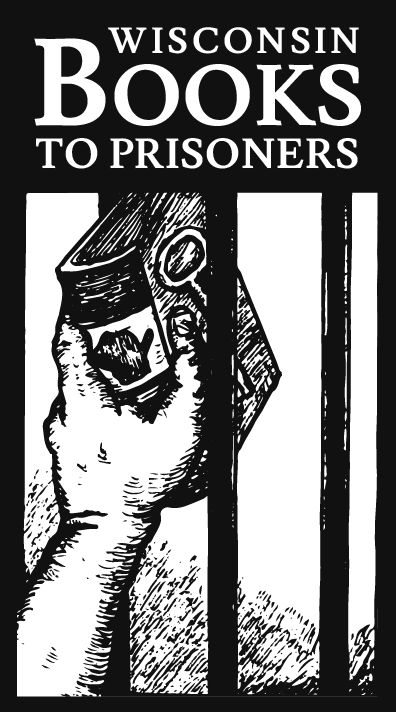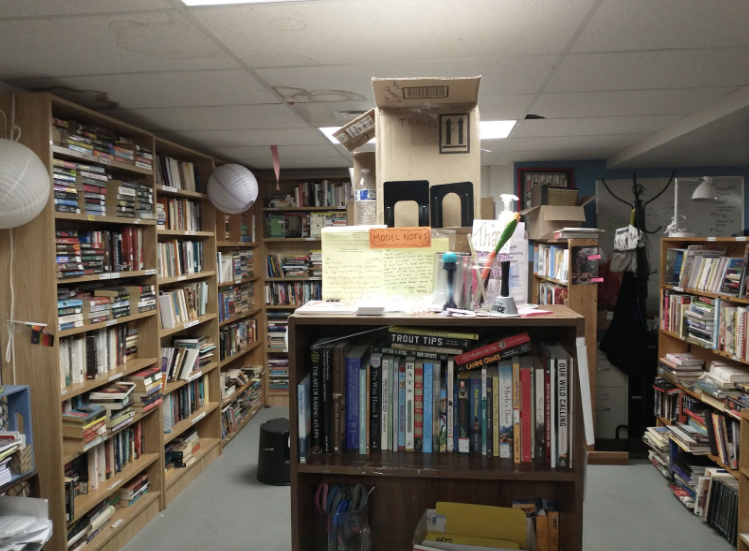
Our Mission
Wisconsin Books to Prisoners (WBTP) is an all-volunteer, nonprofit organization whose mission is to foster a love of reading behind bars, encourage the pursuit of knowledge and self-empowerment, and to help break the cycle of recidivism.
Who We Are
Active since 2006, WBTP is a project of A Room of One’s Own, an independent bookstore in Madison. The store offers a wide selection of current and classic fiction, nonfiction, and periodicals, and maintains a wishlist of books on subject matter that prisoners frequently request.
WBTP is also supported by Woodland Pattern, a nonprofit gallery, book center, and performance space in Milwaukee dedicated to supporting the literary arts, which maintains a wishlist of books that can be purchased as a donation to WBTP.
In addition, WBTP is supported by Voyageur Book Shop in Milwaukee, Lion’s Mouth Bookstore in Green Bay, Mystery to Me in Madison, Chapter 2 Books in Hudson, and Frugal Muse in Madison, as well as by dozens of Wisconsin authors and publishers nationwide.
What We Do
Volunteers meet weekly to read letters from Wisconsin prisoners, select books from the WBTP library, prepare packages, and mail them.
Why We Do It
Incarcerated people face significant barriers to being able to access books and information. Prison libraries are often antiquated and poorly funded, and educational and vocational programs for prisoners are nearly non-existent. WBTP volunteers love to read and want to ensure the same freedom for those living behind bars. We believe that books are tools for learning and can open minds to new ideas and possibilities.
How You Can Help
Interested in volunteering? Please complete our volunteer interest form.
We welcome book donations and, of course, welcome financial contributions.
We are grateful for all your support.
News & Events

Reading for Release: Uzbekistan to Free Prisoners Early if They Finish Chosen Books
by Sarvinoz Ibrokhimova
Euronews
Uzbekistan has approved a law that allows prisoners to reduce their jail sentences by up to 30 days per year, by reading several books, included on a special list. But the educative exercise is not an option for all inmates.

Return to Sender: The Censorship Battle Playing Out in Wisconsin Prisons
by Jeff Oloizia
Madison Magazine
In 2024, the Wisconsin Department of Corrections enacted a sweeping ban on all used book donations to incarcerated people, cutting off what was, for many, a rare lifeline to the outside world. Even before the ban, most donation books never made it past the mail room—rejected for their content or blocked under the guise of drug prevention. As school book bans and free speech crackdowns dominate headlines, a quieter but equally chilling censorship battle is playing out behind prison walls.
Wisconsin Books to Prisoners Update on Used Book “Pilot Program”
For Immediate Release
Friday, June 27, 2025
Contact: Camy Matthay, WisconsinBooksToPrisoners@gmail.com, (608) 455-0885
Wisconsin Books to Prisoners Update on Oakhill Correctional Used Book “Pilot Program“
Since our last update on November 25, 2024, Wisconsin Books to Prisoners (WBTP) has engaged in discussions with Wisconsin Department of Corrections (WI DOC) administrative staff, in opposition to their policy banning the donation of used reading materials. WBTP remains committed to pursuing every possible avenue to challenge this censorship.
Though reassured by the WI DOC that WBTP could continue mailing brand-new books to fulfill the requests of our readers, many of those packages have been returned to us. The status of some packages is still unknown and WBTP is investigating this issue.
Over the past few months, WBTP has participated in a “pilot program” at Oakhill Correctional Institution. Phase one of this program is now complete. During this phase, WBTP sent three packages of books, one third of which were used books. All of the books were processed and added to the facility’s library collection, making them available for checkout by those who requested them. We note that WBTP made it clear at this time that we would not compromise our mission by functioning solely as a “Friends of the Prison Library” group.
The second phase of the pilot will allow us to resume sending used reading materials directly to individuals at Oakhill, while WI DOC develops a broader policy that could permit this in institutions across the state.
We are cautiously optimistic that WBTP will be back or close to our full operations by September 2025. Upon the successful completion of the pilot’s second phase, we expect to be formally approved to resume shipping new and used donated books to people incarcerated throughout Wisconsin.

Wisconsin Books to Prisoners: A Lifeline Cut Short?
by Mihika Shivakumar
The Madison Journal of Literary Criticism
In a world where isolation is often the highest form of punishment, a book can be a lifeline. For many incarcerated individuals, receiving a package of books from Wisconsin Books to Prisoners has been more than a moment of relief—it has been a crack of light shining through dark corners, inviting one to a brighter world of education, imagination, and hope.

Wisconsin Prisons Restrict Books and Mail to Keep Drugs Out, but Some Staff Still Bring Drugs In
by Mario Koran and Hallie Claflin
Wisconsin Watch
Critics say the Wisconsin Department of Corrections is limiting prisoner access to information while wider entry points for drugs remain open.

Wisconsin Escalates Its Long Tradition of Prison Book-Banning
by Scott Gordon and Dan Fitch
Tone Madison
The Wisconsin Department of Corrections’ new ban on Wisconsin Books to Prisoners highlights the arbitrary rules governing incarcerated people’s access to books.
Wisconsin Books to Prisoners Barred from Sending Books to Incarcerated People by Wisconsin Department of Corrections
For Immediate Release
Monday, September 16, 2024
Contact: Camy Matthay, WisconsinBooksToPrisoners@gmail.com, (608) 455-0885
Wisconsin Books to Prisoners (WBTP) has been barred from sending books to incarcerated people by the Wisconsin Department of Corrections (DOC)
(Madison, WI) Wisconsin Books to Prisoners (WBTP) has been sending free reading materials to people incarcerated in Wisconsin since 2006. In that time over 70,000 books have been delivered to eager readers inside Wisconsin prisons and jails without incident. However, an email sent by DOC administrator Sarah Cooper to the all-volunteer nonprofit on August 16, 2024 indicated that the organization would be barred from fulfilling its mission and no longer allowed to send reading materials to people incarcerated in Wisconsin.
Citing individuals who sent mail impersonating “Child Support Agency, the IRS, the State Public Defender’s Office, the Department of Justice and individual attorneys” Cooper said it was not concerned with WBTP, whose history of sending reading materials is without incident, but rather “bad actors who would impersonate” them. For this reason, the organization is being barred. The DOC claims their interest is in increasing safety by regulating book vendors to prevent the introduction of contraband, including drugs, into correctional facilities. To date, no evidence has been provided that reading materials delivered to people in correctional facilities in the state have contained illicit materials.
The WBTP collective condemns this attempt to further limit access to reading materials for incarcerated people. Extensive research has shown that reading significantly contributes to safety and reduces recidivism. The decision to bar WBTP from sending books unnecessarily restricts incarcerated peoples’ access to valuable educational resources, particularly when many facilities suffer from underfunded, outdated, or non-existent library services.
Reading is a fundamental right that everyone deserves.
WBTP is pursuing all legal options in order to address this censorship.
Wisconsin Books to Prisoners is a nonprofit seeking to remedy an issue in Wisconsin that extends nationwide: limited access to books in prison. The organization works to foster a love of reading among inmates, and many of the books they send prisoners help them gain skills and knowledge to use after their eventual release. Since the group’s founding in 2006, they have sent close to 70,000 books to prisoners across the state.

Reading Behind Bars: How a Madison-Based Nonprofit is Breaking the Barrier Between Prisoners and Books
by Hallie Claflin
Madison Commons
Wisconsin Books to Prisoners is a nonprofit seeking to remedy an issue in Wisconsin that extends nationwide: limited access to books in prison. The organization works to foster a love of reading among inmates, and many of the books they send prisoners help them gain skills and knowledge to use after their eventual release. Since the group’s founding in 2006, they have sent close to 70,000 books to prisoners across the state.

Books as Decarceral
by Kelly Brotzman
Inquest
By helping non-incarcerated people to experience a human connection with people inside, volunteering can open a curtain in the mind.

Inside a ‘Nightmare’ Lockdown at a Wisconsin Prison
by Mario Koran
The New York Times
Inmates who have been confined mostly to their cells for more than four months describe unsanitary conditions and a dearth of medical care. Experts say dire staffing shortages are likely to blame and are leading to lockdowns across the country.

Lost in Transit: Digitization of Mail Expands Surveillance Beyond Prisons
by Phillip Vance Smith, II
Logic(s)
As analog forms of surveillance and social control are renegotiated toward digital ones, incarcerated people are isolated and made especially vulnerable.

The Artists Taking on Mass Incarceration
by Adam Bradley
The New York Times Style Magazine
More and more art is challenging long-held assumptions about the criminal justice system.

Major Award for A Room of One’s Own
by Barry Adams
Wisconsin State Journal
Publisher’s Weekly has named Gretchen Treu and Wes Lukes, owners of A Room of One’s Own bookstore, to its Star Watch program that honors up-and-comers in the book business.

Wisconsin’s Prison, Jail Populations Plummet During Pandemic
by Corrinne Hess
Wisconsin Public Radio
The COVID-19 pandemic caused the inmate population at Wisconsin’s local jails to decline by more than one-third in 2020, according to a new report by the Wisconsin Policy Forum.

The Prison ‘Old-Timers’ Who Gave Me Life
by Darnell Epps
The New York Times
Aging inmates, some serving life sentences, helped author Darnell Epps turn his life around. He believes they could do even more good on the outside.

The Newest Jim Crow
by Michelle Alexander
The New York Times
Recent criminal justice reforms contain the seeds of a frightening system of “e-carceration.” This article is an addendum to Michelle Alexander’s 2010 eye-opening book The New Jim Crow.
